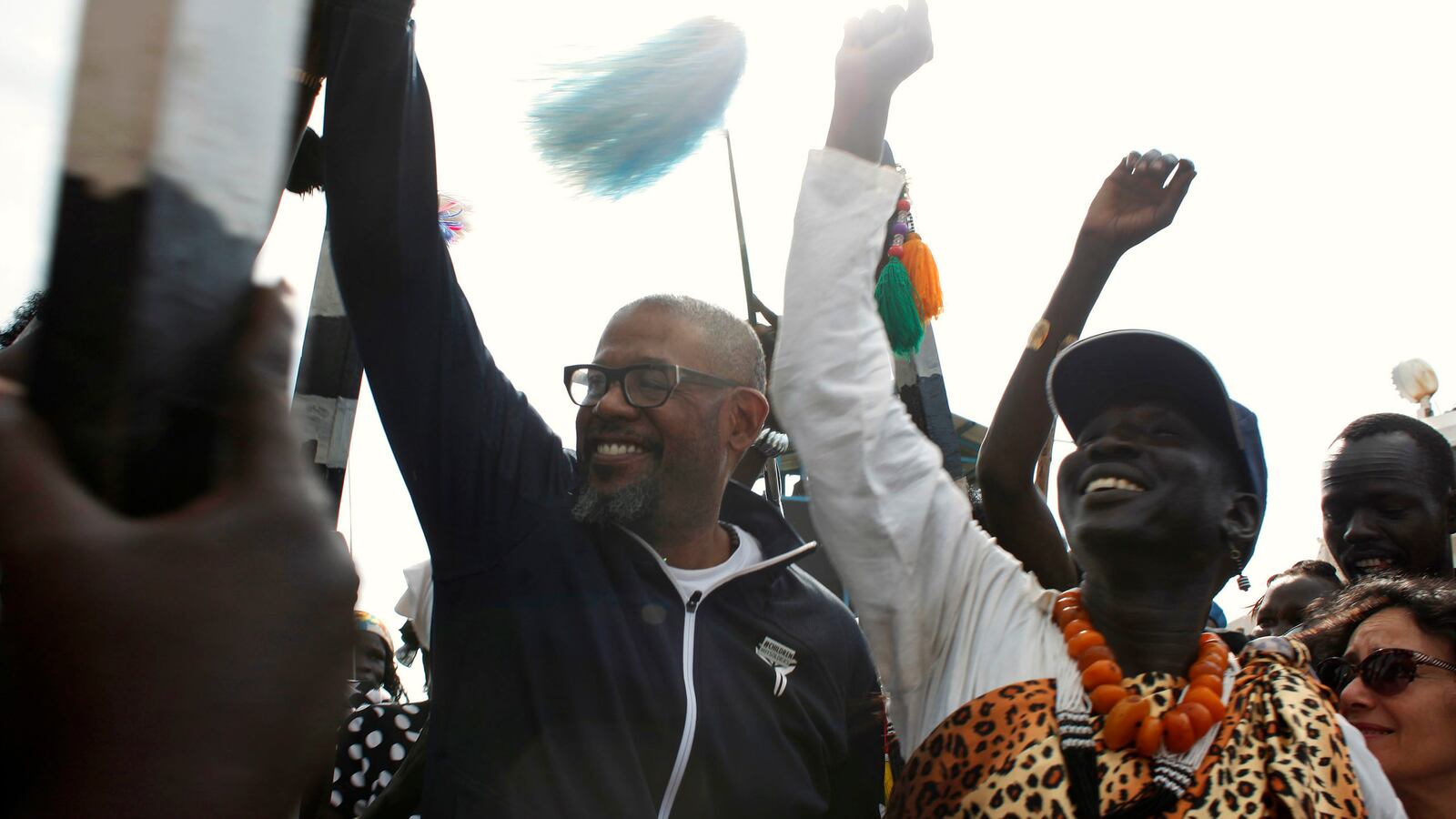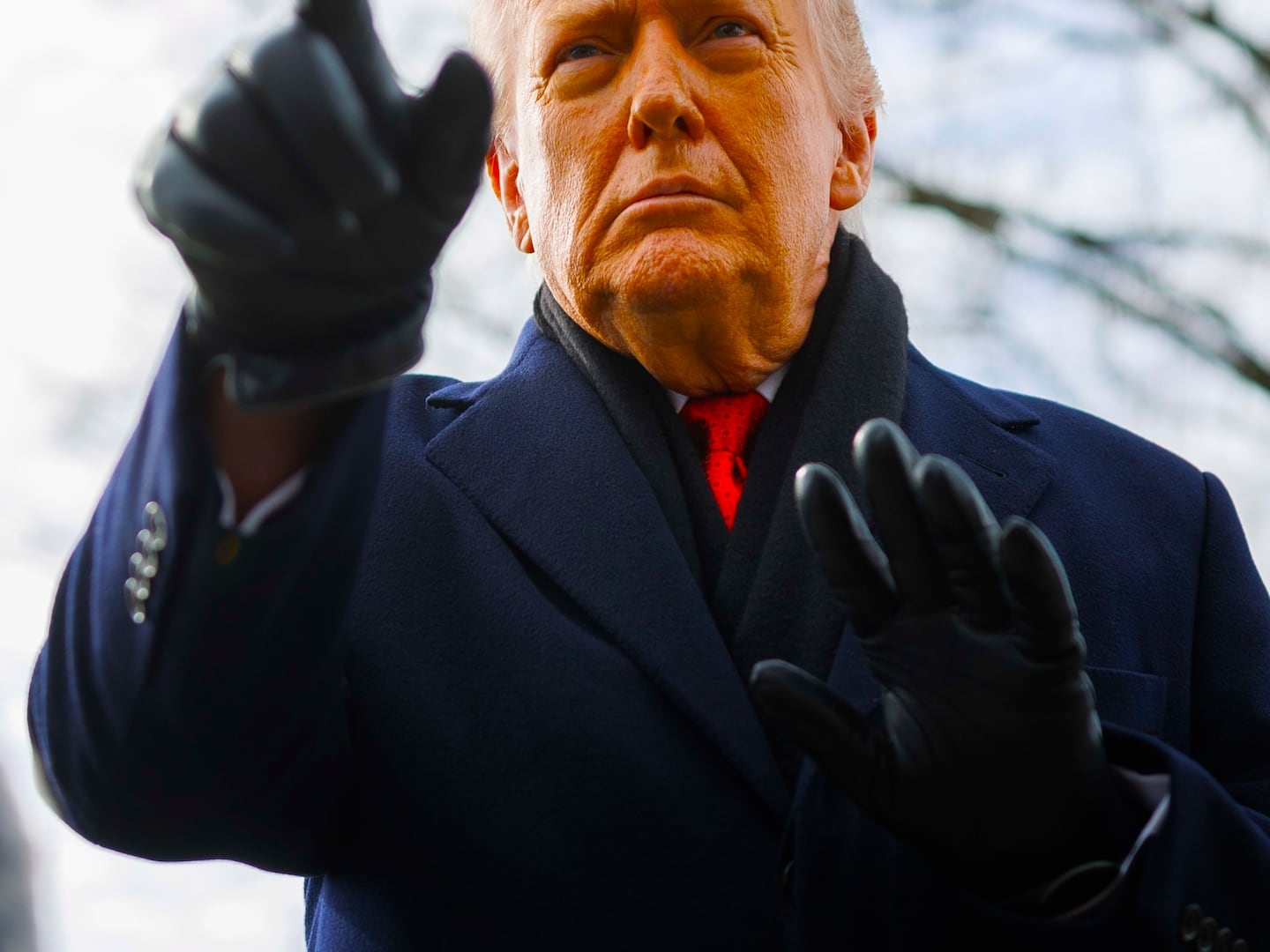JUBA, South Sudan—Oscar-winning actor Forest Whitaker is one of those rare goodwill ambassadors who visits long-suffering and long-forgotten corners of the globe and appears, despite his height and bulk, to be almost as fragile as the people he wants to help.
He would never say that, of course. The people he wants the world to notice are child soldiers, boys and girls who are victims of violence and cruelty almost beyond imagining. But as we sat for a few moments in the mercifully air conditioned recesses of a United Nations office building in the capital of war-ravaged South Sudan last month, I was struck by the extremely humble manner and the real awkwardness of this man who played so brilliantly the tyrant Idi Amin. Only when we began to talk about the horrible realities of specific cases did he come into focus with a striking mixture of sympathy and a kind of quiet ferocity.
“Girls who are abducted or recruited, many are ... assigned to officers,” Whitaker explained grimly. The physical abuse and pain, the fear of gruesome death, which they see all around them—these experiences do not go away when they are freed from the ranks of rebel or government soldiers. “The trauma doesn’t just end when the child escapes,” said Whitaker. They need rehabilitation, he said: education, economic empowerment, and social reintegration. And that is was his foundation, The Whitaker Peace & Development Initiative, hopes to give them.
There was this one young girl he said he had in mind as we talked. She had fled the Lord’s Resistance Army—the band of killers that answer to the infamous Joseph Kony—in northern Uganda. “We were trying to help her with something very basic but, in her situation, something very difficult,” said Whitaker. “We were trying to help her find the freedom to love.”
She was raped often during her captivity, and, despite her freedom, the children she bore remain a constant reminder of the terrifying brutality she endured in her past. How could she love them? How could she not?
“Now she is safe, but she still has to reconcile all the pain she went through and to find peace with her children,” said Whitaker, who was traveling in this war-plagued land on behalf of UNESCO as well as his own foundation, and in the company of Leila Zerrougui, the U.N. special representative for children and armed conflict.
Whitaker hears in the stories of South Sudan an echo of the world where he grew up in South Central Los Angeles. There, as he puts it, “tribal warfare is called gang violence.” That’s why he wants The Whitaker Peace & Development Initiative to be a global enterprise empowering and liberating young people, not just in South Sudan, Uganda or Mexico, but also in the United States, where many urban environments force children into similar traumatic struggles.
Whitaker says he has heard the same types of stories in different contexts all over the world—children forced to be soldiers and to serve soldiers—and he hopes that these personal narratives shared among young people will illuminate the grave realities. “I hope these stories paint a picture of what we really mean when we talk about child soldiers,” he said.
South Sudan is one of the eight countries in which children are still recruited and used by the national army. The United Nations claims that, in recent years, the South Sudanese government has made major strides in reducing the use of children in its military. When the country erupted into civil war last December, however, the national army as well as the rebel opposition resumed recruitment of children into their respective forces. The U.N. estimated that there were fewer than 500 children “actively involved” in the South Sudanese national army at the end of last year. By April, U.N. officials believed that more than 9,000 South Sudanese children had been pulled into the ranks of the soldiers on both sides of the country’s ongoing civil war.
During the visit of Zerrougui and Whitaker, the South Sudanese government renewed its previous commitments and signed the United Nations action plan for the elimination of the use of child soldiers. This is the institutional framework behind UNICEF’s new #ChildrenNotSoldiers awareness campaign, which seeks to work with the eight remaining national governments that exploit child soldiers—Afghanistan, Chad, the Democratic Republic of Congo, Myanmar, Sudan, Somalia, Yemen and South Sudan—to get them to end recruitment, release the children and reintegrate them into society.
Yet the implementation of the action plan relies heavily on the goodwill and partnership of the very governments in question. The framework essentially demands that they “self-police” their own armed forces; the U.N. and its partners do not have the mandate or authority to, for example, randomly monitor government army barracks for children. The eight governments will decide whether to prosecute their own generals or officers accused of using children in armed conflict.
In the case of South Sudan, a U.N. spokesperson explained that the military would handle these issues internally, most likely in military courts. But she said she was not aware of any cases in which the South Sudanese government actually had pursued any punitive measures against its own officers regarding the recruitment or use of child soldiers.
“We said we’d like to end recruitment and the use of children in armed conflict by 2016,” said Zerrougui, “so we are already very late.” She tried to put the best face on the situation. “From my meetings with the government [of South Sudan], I can say they are committed. They recognize their weaknesses and are asking for support. … If you have a commitment that is real and political will that is effective, then we can move forward.”






